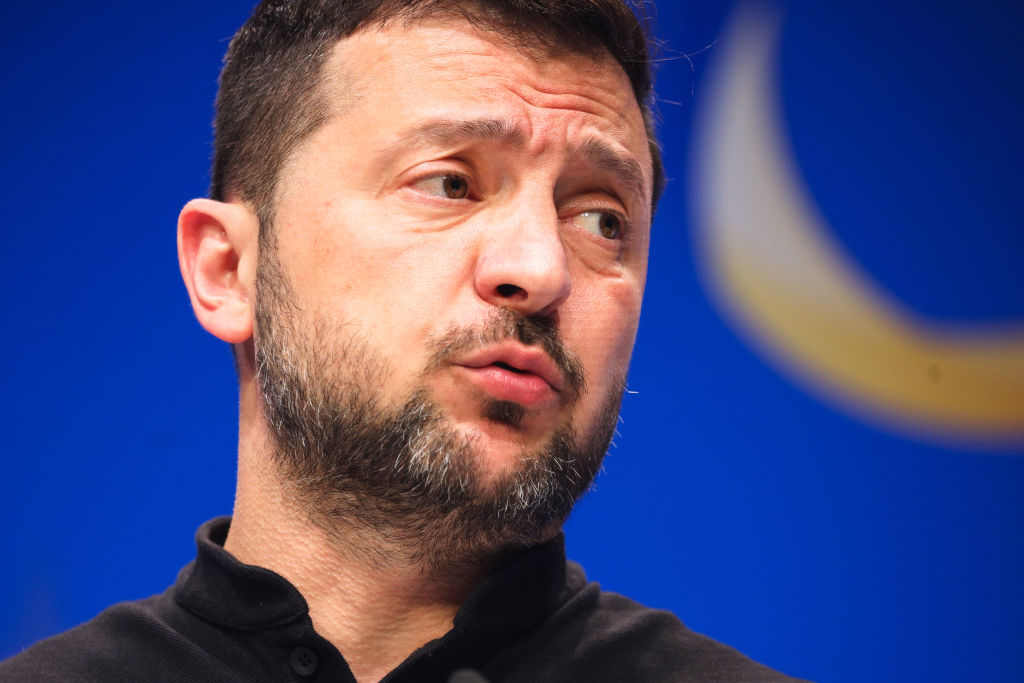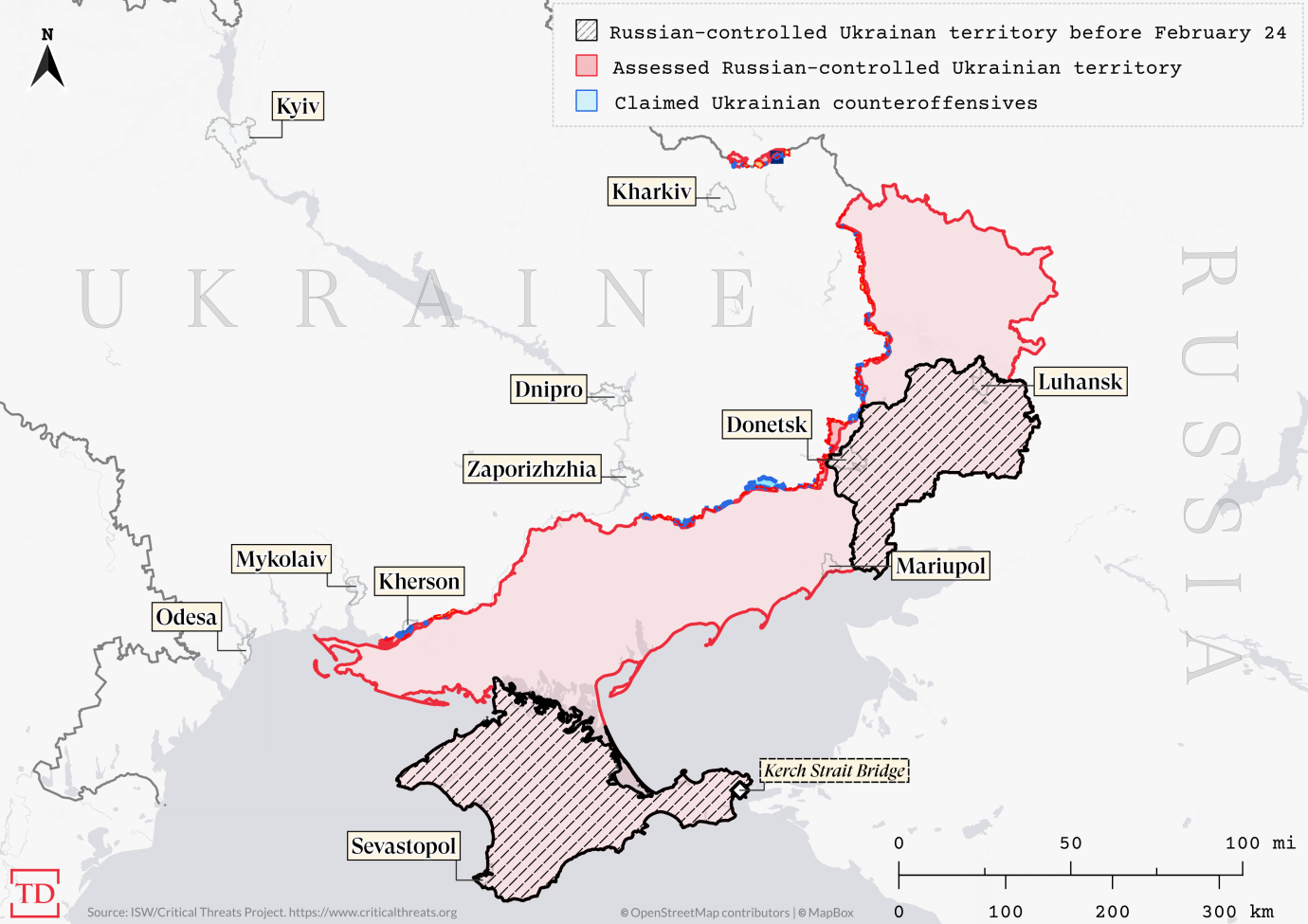Happy Wednesday! We know our crop of summer interns just started, but it’s already time to think about the fall! If you are an undergraduate or master’s student looking to get some real-world journalism experience before you graduate, we hope you’ll check out our 2024 fall internship listing!
Quick Hits: Today’s Top Stories
- Five protesters were killed—apparently by police—and dozens more were injured on Tuesday amid protests in Kenya’s capital city, Nairobi, which saw rioters storm and set ablaze parliament and city hall following a controversial tax hike proposal introduced by the parliament’s ruling coalition late last month. Public resentment toward the tax bill—which includes increases in income, excise, and value-added taxes—boiled over Tuesday afternoon, as law enforcement reportedly used live rounds, rubber bullets, and tear gas against protesters for actions Kenyan President William Ruto described as “treasonous.”
- The first Kenyan police officers arrived in Haiti on Tuesday, the initial wave of an armed force deploying to the island as part of a United Nations-sanctioned mission that plans to send a total of 2,500 armed officials—from eight different countries, led by Kenya—in an effort to restore order to the nation riddled with gang violence. Haitian President Ariel Henry–who resigned in April facing deep unpopularity—first requested foreign troop assistance in October 2022, but the mission has faced numerous delays since being authorized by the U.N. in October 2023. Meanwhile, a United States federal judge sentenced a Haitian gang leader to 35 years in prison on charges related to his role in the kidnapping of 16 U.S. citizens last year and weapons smuggling.
- Israel’s Supreme Court ruled Tuesday that Haredi Jews—an ultra-Orthodox sect that makes up 13 percent of the country’s population—will no longer be exempt from the state’s military draft, an issue that has cleaved Israel for decades. The ultra-Orthodox community’s draft exemption dates back to the country’s founding in 1948—since some Haredi Jewish men choose religious study as their primary occupation—but Israeli judges ruled it exemplified a “burden of inequality.” The decision is likely to strain Israeli Prime Minister Benjamin Netanyahu’s ruling coalition, which relies on two ultra-Orthodox political parties to maintain a majority.
- The International Criminal Court (ICC) issued arrest warrants Tuesday for Russian leaders—current chief of the army general staff, Gen. Valery Gerasimov, and former defense minister, Sergei Shoigu—for alleged war crimes carried out during Russia’s invasion of Ukraine, including against civilian populations. “There are reasonable grounds to believe that the suspects intentionally caused great suffering or serious injury to body or to mental or physical health, thus bearing criminal responsibility for the crime against humanity of other inhumane acts,” the ICC said. The body lacks the authority to execute the arrests, rendering the warrants largely symbolic. In March 2023, the ICC issued arrest warrants on similar grounds for Russian President Vladimir Putin and children’s rights government official Maria Lvova-Belova for their role in forcibly deporting Ukrainian children into Russia.
- Oklahoma’s state Supreme Court ruled Tuesday that a proposed online Catholic school in the state—St. Isidore of Seville Catholic Virtual School—was ineligible to apply for status as a charter school. “Under Oklahoma law, a charter school is a public school. As such, a charter school must be nonsectarian,” the judges wrote in their majority opinion. “However, St. Isidore will evangelize the Catholic faith as part of its school curriculum while sponsored by the State,” in violation of both state law and Oklahoma’s constitution. The Archdiocese of Oklahoma City, which was standing up the school, is likely to appeal the decision, which could eventually bring the issue to the U.S. Supreme Court.
- In two separate rulings, federal judges halted the Biden administration’s latest attempt to “cancel” student debt—the Saving on a Valuable Education (SAVE) Plan—that would lower monthly repayments for almost all borrowers and fully cancel debt within ten years for those who originally borrowed $12,000 or less. A federal judge in Missouri ruled that the program cannot continue with loan forgiveness until the court determines the order’s constitutionality, while a Kansas federal judge blocked a provision that would recalculate monthly debt repayment based on the borrowers’ discretionary income.
- Surgeon General Vivek Murthy on Tuesday declared gun violence a public health crisis. The 39-page public health advisory—which has no enforcement mechanism—notes that firearms are now the leading cause of death for Americans aged 1-19 and that more than half of Americans have experienced a “firearm-related incident.” “Firearm violence is a preventable public health crisis,” Murthy tweeted Tuesday. “Our failure to address it is a moral crisis. To protect the health and well-being of Americans—especially our children—we must now act with the clarity, courage, and urgency the moment demands.” The National Rifle Association labeled the declaration “an extension of the Biden Administration’s war on law-abiding gun owners.”
- China’s Chang’e-6—an uncrewed lunar probe that made history earlier this month when it became the first man-made probe to reach the far side of the moon—returned to Earth on Tuesday with lunar samples from the region, another historic first for China’s space program. Meanwhile, two NASA astronauts will remain at the International Space Station indefinitely while the ship that delivered them there, Boeing’s Starliner, undergoes repairs. Their return to earth was delayed a third time last week while NASA and Boeing engineers continue to troubleshoot problems with the ship after its inaugural trip.
- In the most expensive House primary in U.S. history, progressive Democratic Rep. Jamaal Bowman of New York—who was censured last year for pulling a fire alarm at the U.S. Capitol and whose criticism of Israel has been labeled antisemitic—was ousted on Tuesday by centrist, pro-Israel Democrat George Latimer, Westchester County executive. Meanwhile, Rep. Alexandria Ocasio-Cortez, a fellow New Yorker and member of the House’s left-wing “squad,” successfully warded off a primary challenge from former investment banker Marty Dolan. GOP Rep. Lauren Boebert of Colorado—who switched congressional districts to run in a less competitive district after narrowly winning reelection in 2022—won her Republican primary on Tuesday, making it likely she will serve another term in the seat once filled by Republican Rep. Ken Buck. Several other Republican candidates endorsed by Donald Trump—in Utah, South Carolina, and Colorado—lost their respective primaries on Tuesday.
- A bipartisan group of former lawmakers on Tuesday announced the launch of the “Democracy Defense Project,” a coalition aimed at restoring confidence in the integrity of U.S. elections. The organization will be active mostly in battleground states, including Nevada, Georgia, Pennsylvania, Arizona, Wisconsin, Ohio, and Michigan, as well as New Hampshire. High-profile political figures—like Democratic and Republican former governors—from both parties in each state will helm the projects, which aim to increase the security and transparency of election systems.
Zelensky’s Diplomatic Blitz

On the beaches of Normandy, France, earlier this month, nonagenarian and centenarian D-Day veterans shook dignitaries’ hands as the assembled world leaders recognized the men who, 80 years ago, paved the way for the end of the Nazi occupation of Europe.
One man, wheelchair-bound, seemed to have no idea who Canadian Prime Minister Justin Trudeau was, forcing the Canadian leader to introduce himself to the elderly veteran. But Ukrainian President Volodymyr Zelensky needed no introduction.
The veteran shook Zelensky’s hand and didn’t let go. In fact, it looked as though he tried to kiss it before he pulled Zelensky—clad in the fatigue-like garb typical of the wartime president—into a tight hug.
“You’re the savior of the people,” the veteran told Zelensky, who protested rather bashfully. “You bring tears to my eyes.”
The moment was just one of many highly visible examples of global support for Ukraine this month, more than two years after Russian President Vladimir Putin launched the biggest land war in Europe since the one that elderly veteran fought to end.
Zelensky, for his part, is continuing to show his face on the international stage, trying—with some success—to keep the country’s allies from growing weary of supporting Ukraine as the war grinds on. And far from the glamor of international diplomacy—but ever-influenced by it—Ukraine’s war is shaped by international partners’ willingness, or lack thereof, to give the country free rein to defend against the invading force.
Ukraine formally began accession talks with the European Union (EU) on Tuesday, a decade after Ukrainians’ desire to join the bloc arguably precipitated Russia’s annexation of Crimea. But it will still be years before Ukraine becomes a full EU member; the country will, likely during wartime, have to adopt legislation and reforms to align its institutions with those of the currently 27-country bloc.
The opening of negotiations is nevertheless a meaningful and concrete step toward even deeper integration with the European continent—a massive own goal by Russian President Vladimir Putin. “When we signed the application for EU membership on the fifth day of the full-scale war, many said it was nothing but a dream,” Zelensky said Tuesday. “But we made this dream a reality.”
Zelensky is assuredly hoping another dream becomes a reality in the coming weeks: that Ukraine secures a concrete plan for accession into NATO at a leaders summit in Washington next month. In some ways, becoming a member of the 32-nation defensive alliance is even more fraught than joining the EU. As we reported last summer, the issue sparked much debate—and, indeed, controversy—at the last NATO summit, at least in part because admitting the war-torn country would theoretically make it subject to the alliance’s Article 5 mutual defense pact and potentially pull NATO countries into direct conflict with Russia.
The question of the summit—over which negotiations are already ongoing—will be whether Ukraine gets a formal and “irreversible” invitation to join the alliance, a concrete step that would boost Ukrainian morale and potentially ward off further aggression from Putin for fear of risking open conflict with NATO. “Ukrainians would be ecstatic—a huge morale boost to the Ukrainians,” David Kramer, executive director of the George W. Bush Institute, told TMD of a potential offer of NATO accession. “It would, I think, help tilt the military balance in Ukraine’s favor, because it would be a blow to the Russian forces on the ground fighting who will say, ‘Well, what the hell are we doing?’ And I think it might even scare some people in Moscow, worrying that this increases the potential for a direct clash with NATO, which Putin clearly has shown he does not want.”
The Biden administration has been resistant to more fulsome declarations of Ukraine’s NATO destiny, highlighting in public—and reportedly behind-the-scenes—Ukraine’s ongoing issues with corruption. Peace in Ukraine, President Joe Biden said in an interview with Time Magazine late last month, “doesn’t mean NATO, they are part of NATO, it means we have a relationship with them like we do with other countries, where we supply weapons so they can defend themselves in the future.” Still, Biden and Zelensky did sign a 10-year defense pact earlier this month that seemed geared at preparing Ukraine for eventual NATO membership.
But there are, of course, political implications to consider. “I hope the Biden administration will recognize the moment that they face,” Kramer said. “There’s a possibility this will be their last NATO summit if there’s an election in November that produces a change in administration here.”
Indeed, Reuters reported Tuesday that two advisers to former President Donald Trump—who’s been hot and (mostly) cold on support for Ukraine—presented the Republican candidate with a peace plan for the war that would make continued weapons shipments to Ukraine dependent on Zelensky agreeing to peace talks. Retired Lt. Gen. Keith Kellogg and Fred Fleitz, two former members of the Trump White House’s National Security Council, said their plan would also have Washington tell Moscow that a refusal to negotiate would increase U.S. support for Ukraine. Kellogg told Reuters he and Fleitz had presented the plan to Trump and that it was positively received.
“Even if peace broke out and Zelensky and Putin sat at the same table, how could anyone be confident that what was agreed by Putin would actually be meaningful?” said Douglas Lute—former U.S. ambassador to NATO during the Obama administration and a retired lieutenant general in the U.S. Army who served as President George W. Bush’s deputy national security adviser—speaking about the prospects of negotiations generally and not this specific plan. “There’s little reason to believe that any agreement signed by Vladimir Putin would be credible.”
The Kremlin played coy in response to the Kellogg/Fleitz proposal. “The value of any plan lies in the nuances and in taking into account the real state of affairs on the ground,” Kremlin spokesman Dmitry Peskov said. That “real state of affairs” is—it’s worth noting—Russian occupation, suggesting Moscow could leverage the plan, if it materialized, to seek territorial concessions from Kyiv.
But Zelensky is doing all he can to head off such concessions at the pass diplomatically, as well as militarily. In Switzerland earlier this month, he convened representatives of more than 90 countries—including U.S. Vice President Kamala Harris but not delegates from Russia or China—for a so-called peace summit. The vast majority of those countries signed onto a communiqué calling for the “territorial integrity” of Ukraine to be the basis of any peace agreement.
On the ground in Ukraine, Russia’s push toward the northeastern city of Kharkiv—which we detailed here a few weeks ago—seems to have stalled, stopping well short of breaking the line wide open and taking the country’s second-biggest city. The steady trickle of U.S. weapons authorized in the April foreign aid supplemental seemed to help Ukrainian soldiers hold the line. As Joseph Roche reported from Ukraine in a piece on the site last week:
[Ukrainian brigade commander] Viatcheslav, buoyed by Ukraine’s successes on the Kharkiv front, continues to believe in an imminent victory. “The offensive wasn’t a surprise and the Russians had to sacrifice many men and materials that they won’t be able to use in the Donbas.”
The commander also thinks the tough days are behind them and that Western aid on the front is beginning to make a difference. “I can’t reveal everything because it’s classified, but all I can say is that we’re seeing an improvement in our capabilities and our brigade has received more than we could have hoped for.”

Among the U.S.-supplied weapons are long-range Army Tactical Missile Systems (ATACMS), a missile system that Ukrainians have used to strike deep behind the frontlines in places like Crimea, targeting logistics hubs and staging areas in Russian-occupied parts of Ukraine. However, the Biden administration had barred Ukraine from using those or any other U.S.-provided weapons to hit internationally recognized Russian territory for fear of an escalatory reaction from the Kremlin. (Ukrainians used ATACMS to target Russian-occupied Sevastopol, Crimea, on Sunday, and shrapnel from the intercepted missiles reportedly killed five people. Russia threatened retaliation against the U.S.—suggesting it doesn’t need the pretense of a cross-border attack to bang the escalation drum.)
In Kharkiv, though, Ukrainian officials argued that U.S.-imposed restrictions allowed the Russian army a safe haven across the border to prepare its attacks. After public urging from such figures as NATO Secretary-General Jens Stoltenberg and a series of reversals by Western European allies, the Biden administration lifted certain restrictions late last month, permitting Ukraine to strike only just across the border from Kharkiv with some U.S. weapons, though not with ATACMS (despite French President Emmanuel Macron greenlighting use of the French equivalent for military targets in Russian territory).
Last week, the U.S. seemed to expand the area Ukraine could target, though the details of what that meant in practice were vague. “The ability to be able to fire back when fired upon is really what this policy is focused on,” Pentagon spokesman Maj. Gen. Pat Ryder said Thursday. “So, again, as we see Russian forces firing across the border, the ability for Ukraine to fire back at those ground forces using U.S. provided munitions, it’s self-defense, and so it makes sense for them to be able to do that.” The Pentagon still declined to change its policy on the use of ATACMS for cross-border strikes.
“I think it’s unjustifiable,” Lute told TMD of the restrictions on where Ukraine may launch attacks inside Russia. “What’s the difference between hitting a Russian artillery piece just across the border in the vicinity of Kharkiv that’s pummeling the city of Kharkiv and killing Ukrainian civilians [versus] an airbase that’s 100 kilometers inside Russia?”
Lute predicted the restrictions will eventually be relaxed even further—a change that could allow Ukraine to strike Russian air bases from which the jets carrying glide bombs that have targeted civilians, military targets, and other non-military infrastructure are originating. “Like so many of the administration’s decisions in support of Ukraine,” he said, “they eventually get around to doing what’s justified, legitimate, and required in the defense of Ukrainian sovereignty and territorial integrity, but they do it too late.”
Worth Your Time
- John Shelton argued in National Affairs that fusionism—the political philosophy that blends free market economics, a hawkish foreign policy, and traditional social values—is not dead, it just needs to be refreshed to incorporate the splintering coalitions of the right. “A revitalized fusionism would restore family policy to the forefront of its agenda,” he wrote. “To pull this off, today’s fusionists will need to apply tools from the Reagan era to ensure that agencies consider adverse effects on family formation when crafting new rules. Such an approach would appeal to social conservatives, satisfy small-government libertarians who want to stem the tide of agency rulemaking, and prove alluring to Catholic integralists, their Protestant cousins, and other post-liberals who want to redeem the administrative state. … The old-school fusionist coalition of conservatives and libertarians may continue to hope for the eventual demise of the administrative state, but unless and until that happens, focusing on directing the administrative state toward promoting and protecting families would allow that coalition to fold in new-right movements — including those that otherwise resent ‘zombie Reaganism.’”
- Kicking off a series for The Athletic, Andy McCullough explored a fundamental shift in baseball strategy that has changed the face of the game. “Growing up in the first decade of the 21st century, pitchers were taught to value the same things pitchers prioritized in the 20th century, searching for soft contact and quick innings,” he wrote. “An at-bat should not last longer than three pitches.” But that idea is outmoded in the modern game, something Los Angeles Dodgers starting pitcher Tyler Glasnow realized as a little leaguer. “He did not need soft contact if the hitters never made contact. In his mind, he conjured up a new ideal to chase. ‘The perfect inning for me,’ Glasnow said, ‘is nine pitches, nine strikes, three strikeouts.’ The simple concept Glasnow grasped as a child has come to reshape the game he plays as an adult. Like the embrace of the three-point shot in basketball or the advent of the downfield pass in football, modern baseball’s obsession with strikeouts has led to a jarring transformation.”
Presented Without Comment
New York Times: Biden Officials Pushed to Remove Age Limits for Trans Surgery, Documents Show
“Newly released emails from an influential group issuing transgender medical guidelines indicate that U.S. health officials lobbied to remove age minimums for surgery in minors because of concerns over political fallout.”
Also Presented Without Comment
CNN: South Korean Military Says 350 Waste Balloons Detected From North Korea Overnight as Tensions Flare
Also Also Presented Without Comment
Mediaite: Speaker [Mike] Johnson Concedes, ‘No One Expects That Joe Biden Will Be on Cocaine’ During Debate
In the Zeitgeist
July is just around the corner, so maybe it’s time for a little “Christmas in July”? We happen to think what the Christmas movie canon really needed was this acid trip of a film about a quest to find a kidnapped Santa—J.K. Simmons??—led by a nerdy Chris Evans and Santa’s bodyguard, Dwayne “The Rock” Johnson.
Toeing the Company Line
- In the newsletters: Nick explored (🔒) why Republican support for gay marriage has dropped in recent years.
- On the podcasts: Kevin takes over for Jonah on today’s episode of The Remnant, discussing Adam Smith, free trade, and tax law with Kent Lassman, the president of the Competitive Enterprise Institute.
- On the site today: Cole explains how two Florida men—Trump and Sen. Marco Rubio—could be running mates though they’re from the same state, Jonah argues this presidential debate might actually matter, and Brian Riedl pans the economic agendas of both Biden and Trump. “Unfortunately, neither Biden nor Trump are offering plausible, pro-growth, or realistic solutions on any of these issues,” Riedl writes. “And in fact, Trump has suggested economic policies that—if he is serious about implementing them—would be extraordinarily damaging to the economy.”
Let Us Know
What do you make of the Trump advisers’ peace plan for Ukraine?











Please note that we at The Dispatch hold ourselves, our work, and our commenters to a higher standard than other places on the internet. We welcome comments that foster genuine debate or discussion—including comments critical of us or our work—but responses that include ad hominem attacks on fellow Dispatch members or are intended to stoke fear and anger may be moderated.
With your membership, you only have the ability to comment on The Morning Dispatch articles. Consider upgrading to join the conversation everywhere.